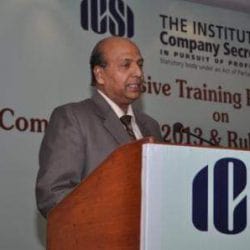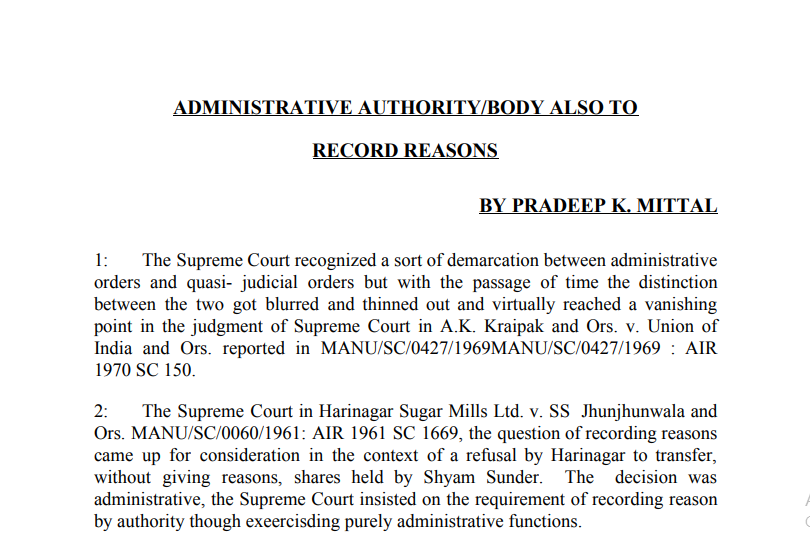Administrative Authority/Body Also To Record Reasons
Administrative Authority/Body Also To Record Reasons
1: The Supreme Court recognized a sort of demarcation between administrative orders and quasi-judicial orders but with the passage of time the distinction between the two got blurred and thinned out and virtually reached a vanishing point in the judgment of Supreme Court in A.K. Kraipak and Ors. v. Union of India and Ors. reported in MANU/SC/0427/1969MANU/SC/0427/1969: AIR 1970 SC 150.
2: The Supreme Court in Harinagar Sugar Mills Ltd. v. SS Jhunjhunwala and Ors. MANU/SC/0060/1961: AIR 1961 SC 1669, the question of recording reasons came up for consideration in the context of a refusal by Harinagar to transfer, without giving reasons, shares held by Shyam Sunder. The decision was administrative, the Supreme Court insisted on the requirement of recording reason by authority though exercising purely administrative functions.
3: In the case of Bhagat Raja v. Union of India and Ors. MANU/SC/0002/1967: AIR 1967 SC 1606, the Constitution Bench of this Court examined the question whether the Central Government was bound to pass a speaking order while dismissing a revision and confirming the order of the State Government in the context of Mines and Minerals (Regulation and Development) Act, 1957.
3.1: Where the State Government gives a number of reasons some of which are good and some are not, and the Central Government merely endorses the order of the State Government without specifying any reason, the Supreme Court may find it difficult to ascertain which are the grounds on which Central Government upheld the order of the State Government. Therefore, the Supreme Court insisted on reasons being given for the order.
4: In M/s. Mahabir Prasad Santosh Kumar v. State of U.P and Ors. MANU/SC/0018/1970: AIR 1970 SC 1302, while dealing with U.P. Sugar Dealers License Order under which the license was cancelled, the Supreme Court held that such an order of cancellation is quasi-judicial and must be a speaking one. The Court held that merely giving an opportunity of hearing is not enough and further pointed out where the order is subject to appeal, the necessity to record reason is even greater.
5: In the case of M/s. Travancore Rayons Ltd. v. The Union of India and Ors. MANU/SC/0280/1969: AIR 1971 SC 862, the Court, dealing with the revisional jurisdiction of the Central Government under the then Section 36 of the Central Excise and Salt Act, 1944, held that the Central Government was actually exercising judicial power and in exercising judicial power, reasons in support of the order must be disclosed.
6: In M/s. Woolcombers of India Ltd. v. Woolcombers Workers Union and Anr. MANU/SC/0283/1973: AIR 1973 SC 2758, this Court while considering an award under Section 11 of Industrial Disputes Act insisted on the need of giving reasons in support of conclusions in the Award. The requirement of giving a reason is to prevent unfairness or arbitrariness in reaching conclusions. Secondly, justice should not only be done, but it should also appear to be done as well.
7: In Union of India v. Mohan Lal Capoor and Ors. MANU/SC/0405/1973: AIR 1974 SC 87, this Court while dealing with the question of selection under Indian Administrative Service/Indian Police Service (Appointment by Promotion Regulation) held that the expression “reasons for the proposed supersession” should not be mere rubber stamp reasons. Such reasons must disclose how the mind was applied to the subject matter for a decision regardless of the fact whether such a decision is purely administrative or quasi-judicial. Reasons in such context would mean the link between materials which are considered and the conclusions which are reached.
8: In M/s. Star Enterprises v. CIDCO Ltd and Ors. MANU/SC/0459/1990: (1990) 3 SCC 280, Court held that judicial review of administrative action has become expansive and is becoming wider day by day and the State has to justify its action in various fields of public law. All these necessitate recording of the reason for executive actions including the rejection of the highest offer. The Court held that disclosure of reasons in matters of such rejection provides an opportunity for an objective review both by superior administrative heads and for the judicial process.
Read the copy:
 Advocate Pradeep Kumar
Advocate Pradeep Kumar
PK Mittal BCom Delhi university 1975 LLB Delhi University 1978 FCS Fellow Member of ICSI 1992 1982 to 1992 as CS in Corporate Head Legal Apollo Tyres Ltd 1986 to 1992 1993 onwards Advocate in Delhi High Court CESTAT NCLT = Practcising Indirect Tax and Corporate laws 1993 to till date. Written more than 100 Article on Company Law and Corporate laws Indirect Tax Speaker on Indirect Tax Co Law and IBC in various Seminars Workshop organised by ICAI ICSI and ICMA and other organisations Convenor Core Group on GST of ICSI








